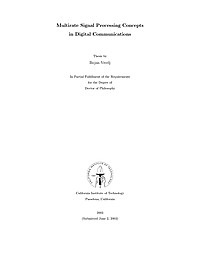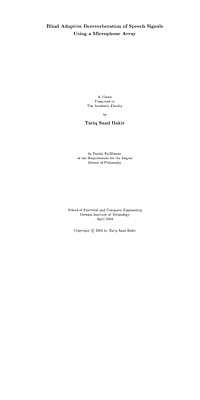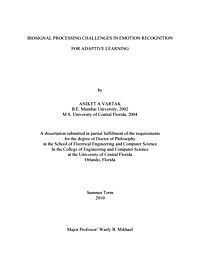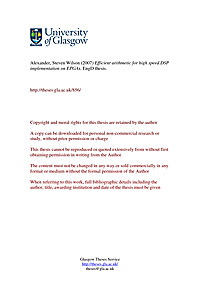
Multirate Signal Processing Concepts in Digital Communications
Multirate systems are building blocks commonly used in digital signal processing (DSP). Their function is to alter the rate of the discrete-time signals, by adding or deleting a portion of the signal samples. They are essential in various standard signal processing techniques such as signal analysis, denoising, compression and so forth. During the last decade, however, they have increasingly found applications in new and emerging areas of signal processing, as well as in several neighboring disciplines such as digital communications. The main contribution of this thesis is aimed towards a better understanding of multirate systems and their use in modern communication systems. To this end, we first study a property of linear systems appearing in certain multirate structures. This property is called biorthogonal partnership and represents a terminology introduced recently to address a need for a descriptive term for such class of filters. In the thesis we especially focus on the extensions of this simple idea to the case of vector signals (MIMO biorthogonal partners) and to accommodate for nonintegral decimation ratios (fractional biorthogonal partners). The main results developed here study the properties of biorthogonal partners, e.g., the conditions for the existence of stable and of finite impulse response (FIR) partners. In this context we develop the parameterization of FIR solutions, which makes the search for the best partner in a given application analytically tractable. This proves very useful in their central application, namely, channel equalization in digital communications with signal oversampling at the receiver. A good channel equalizer in this context is one that helps neutralize the distortion on the signal introduced by the channel propagation but not at the expense of amplifying the channel noise. In the second part of the thesis, we focus on another class of multirate systems, used at the transmitter side in order to introduce redundancy in the data stream. This redundancy generally serves to facilitate the equalization process by forcing certain structure on the transmitted signal. We first consider the transmission systems that introduce the redundancy in the form of a cyclic prefix. The examples of such systems include the discrete multitone (DMT) and the orthogonal frequency division multiplexing (OFDM) systems. We study the signal precoding in such systems, aimed at improving the performance by minimizing the noise power at the receiver. We also consider a different class of communication systems with signal redundancy, namely, the multiuser systems based on code division multiple access (CDMA). We specifically focus on the special class of CDMA systems called `a mutually orthogonal usercode receiver' (AMOUR). We show how to find the best equalizer from the class of zero-forcing solutions in such systems, and then increase the size of this class by employing alternative sampling strategies at the receiver.

Blind Adaptive Dereverberation of Speech Signals Using a Microphone Array
In this thesis, we present a blind adaptive speech dereverberation method based on the use of a reduced mutually referenced equalizers (RMRE) criterion. The method is based on the idea of the inversion of single-input multiple-output FIR linear systems, and as such requires the use of multiple microphones. However, unlike many traditional microphone array methods, there is no need for a specific array configuration or geometry. The RMRE method finds a subset of equalizers for a given delay in a single step, without the need for the typical channel estimation step. This makes the method practical in terms of implementation and avoids the pitfalls of the more complicated two step dereverberation approach, typical in many inversion methods. Additionally, only the second-order statistics of the signals recorded by the microphones are used, without the need for utilizing higher-order statistics information typically needed when the channsls have a nonminimum phase response, as is the case with room impulse responses. We present simulations and experimental results that demonstrate the applicability of the method when the input is speech, and show that in the noiseless case, perfect dereverberation can be achieved. We also evaluate its performance in the presence of noise, and we present a possible way to modify the proposed RMRE to work for very low SNR values. We also explore the problems when model-order mismatches are present, and demonstrate that the under-modeling of the channel impulse responses order can be combated by increasing the number of microphones. For order over-estimation, we will show that RMRE can handle such errors with no modification.
Efficient Signal Processing Techniques for Future Wireless Communications Systems
Wireless communications systems are evolving to be more diverse in use and more ubiquitous in nature. It is of fundamental importance that we consume the resources available in such systems, i.e., bandwidth and energy, to preserve room for more users and to preserve longevity. Signal processing can greatly help us achieve this. In this thesis we consider improving the utility of resources available in wireless communications systems. The basic obstacle for most wireless communications systems is the multipath channel that causes intersymbol interference. Channel estimation is a crucial step for recovering the transmitted symbols. Moreover, as more devices are equipped with wireless capabilities, the bandwidth becomes scarce and it is important to allow more than one device or more than one user to use the same frequency range or the same channel. However, this introduces multiuser interference, which is again eliminated only if the channel is known. Furthermore, most wireless systems are battery powered, at least at the transmitter end. Hence it is crucial that energy consumption is minimized to preserve the longevity of the system. The contribution of this thesis is three fold: (i) We propose novel bandwidth efficient blind channel estimation algorithms for single input multiple output systems, and for multiuser OFDM systems. The former exploits cyclostationarity inherent in communications signals. The latter exploits the structure introduced to the transmitted signal via precoding. We consider design of such precoders by optimizing performance metrics such as the bit error rate and signal to interference plus noise ratio. (ii) In the multiuser systems case, we propose a novel cooperative OFDM system and show that, when users face significantly different channel conditions, cooperation can improve the performance of all the cooperating users. (iii) We consider energy efficient training based system estimation in large MIMO systems. The goal there is to minimize energy consumption both in transmission of training symbols and in performing computations. We show that by using a divide and conquer strategy in selecting the active set of transmitters and receivers, it is possible to minimize energy consumption without degrading the accuracy of the channel estimate.

Biosignal processing challenges in emotion recognition for adaptive learning
User-centered computer based learning is an emerging field of interdisciplinary research. Research in diverse areas such as psychology, computer science, neuroscience and signal processing is making contributions to take this field to the next level. Learning systems built using contributions from these fields could be used in actual training and education instead of just laboratory proof-of-concept. One of the important advances in this research is the detection and assessment of the cognitive and emotional state of the learner using such systems. This capability moves development beyond the use of traditional user performance metrics to include system intelligence measures that are based on current theories in neuroscience. These advances are of paramount importance in the success and wide spread use of learning systems that are automated and intelligent. Emotion is considered an important aspect of how learning occurs, and yet estimating it and making adaptive adjustments are not part of most learning systems. In this research we focus on one specific aspect of constructing an adaptive and intelligent learning system, that is, estimation of the emotion of the learner as he/she is using the automated training system. The challenge starts with the definition of the emotion and the utility of it in human life. The next challenge is to measure the co-varying factors of the emotions in a non-invasive way, and find consistent features from these measures that are valid across wide population. In this research we use four physiological sensors that are non-invasive, and establish a methodology of utilizing the data from these sensors using different signal processing tools. A validated set of visual stimuli used worldwide in the research of emotion and attention, called International Affective Picture System (IAPS), is used. A dataset is collected from the sensors in an experiment designed to elicit emotions from these validated visual stimuli. We describe a novel wavelet method to calculate hemispheric asymmetry metric using electroencephalography data. This method is tested against typically used power spectral density method. We show overall improvement in accuracy in classifying specific emotions using the novel method. We also show distinctions between different discrete emotions from the autonomic nervous system activity using electrocardiography, electrodermal activity and pupil diameter changes. Findings from different features from these sensors are used to give guidelines to use each of the individual sensors in the adaptive learning environment.

Multirate Signal Processing Concepts in Digital Communications
Multirate systems are building blocks commonly used in digital signal processing (DSP). Their function is to alter the rate of the discrete-time signals, by adding or deleting a portion of the signal samples. They are essential in various standard signal processing techniques such as signal analysis, denoising, compression and so forth. During the last decade, however, they have increasingly found applications in new and emerging areas of signal processing, as well as in several neighboring disciplines such as digital communications. The main contribution of this thesis is aimed towards a better understanding of multirate systems and their use in modern communication systems. To this end, we first study a property of linear systems appearing in certain multirate structures. This property is called biorthogonal partnership and represents a terminology introduced recently to address a need for a descriptive term for such class of filters. In the thesis we especially focus on the extensions of this simple idea to the case of vector signals (MIMO biorthogonal partners) and to accommodate for nonintegral decimation ratios (fractional biorthogonal partners). The main results developed here study the properties of biorthogonal partners, e.g., the conditions for the existence of stable and of finite impulse response (FIR) partners. In this context we develop the parameterization of FIR solutions, which makes the search for the best partner in a given application analytically tractable. This proves very useful in their central application, namely, channel equalization in digital communications with signal oversampling at the receiver. A good channel equalizer in this context is one that helps neutralize the distortion on the signal introduced by the channel propagation but not at the expense of amplifying the channel noise. In the second part of the thesis, we focus on another class of multirate systems, used at the transmitter side in order to introduce redundancy in the data stream. This redundancy generally serves to facilitate the equalization process by forcing certain structure on the transmitted signal. We first consider the transmission systems that introduce the redundancy in the form of a cyclic prefix. The examples of such systems include the discrete multitone (DMT) and the orthogonal frequency division multiplexing (OFDM) systems. We study the signal precoding in such systems, aimed at improving the performance by minimizing the noise power at the receiver. We also consider a different class of communication systems with signal redundancy, namely, the multiuser systems based on code division multiple access (CDMA). We specifically focus on the special class of CDMA systems called `a mutually orthogonal usercode receiver' (AMOUR). We show how to find the best equalizer from the class of zero-forcing solutions in such systems, and then increase the size of this class by employing alternative sampling strategies at the receiver.

Efficient arithmetic for high speed DSP implementation on FPGAs
The author was sponsored by EnTegra Ltd, a company who develop hardware and software products and services for the real time implementation of DSP and RF systems. The field programmable gate array (FPGA) is being used increasingly in the field of DSP. This is due to the fact that the parallel computing power of such devices is ideal for today’s truly demanding DSP algorithms. Algorithms such as the QR-RLS update are computationally intensive and must be carried out at extremely high speeds (MHz). This means that the DSP processor is simply not an option. ASICs can be used but the expense of developing custom logic is prohibitive. The increased use of the FPGA in DSP means that there is a significant requirement for efficient arithmetic cores that utilises the resources on such devices. This thesis presents the research and development effort that was carried out to produce fixed point division and square root cores for use in a new Electronic Design Automation (EDA) tool for EnTegra, which is targeted at FPGA implementation of DSP systems. Further to this, a new technique for predicting the accuracy of CORDIC systems computing vector magnitudes and cosines/sines is presented. This work allows the most efficient CORDIC design for a specified level of accuracy to be found quickly and easily without the need to run lengthy simulations, as was the case before. The CORDIC algorithm is a technique using mainly shifts and additions to compute many arithmetic functions and is thus ideal for FPGA implementation.



















